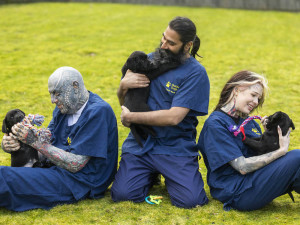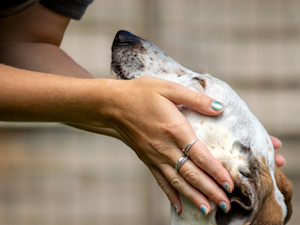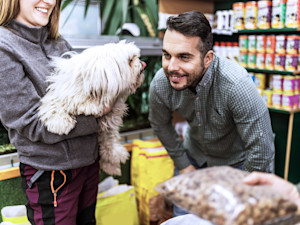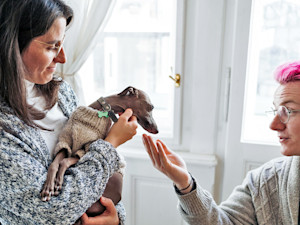The Dog Fostering Lifeline Helping People Flee Domestic Abuse
Beloved pets are often used by perpetrators of domestic abuse to manipulate their victims. That’s why Dogs Trust runs a specialist service to temporarily home dogs while their parents seek safety
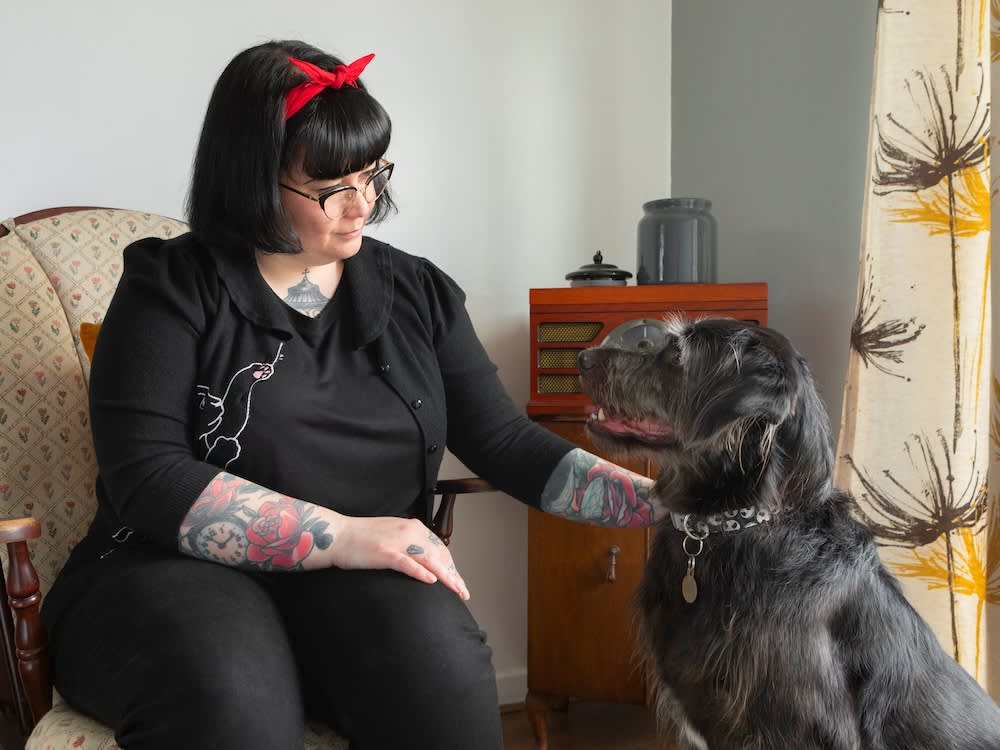
Share Article
Trigger warning: domestic violence and abuse
“There’s no words to describe the feeling,” says Sophie* on being reunited with her dog Murphy*. Sophie and Murphy both suffered through domestic abuse at the hands of Sophie’s partner. And when they managed to escape the dangerous situation together, Sophie found that Murphy wasn’t allowed in the refuge with her. “But Murphy was affected by the abuse, too,” she explains.

Get (totally free) deals for food, treats, accessories, tech and way more pet parenting must-haves.
Instead, Murphy went into the care of Dogs Trust’s specialist service Freedomopens in new tab, which provides dogs with a temporary home until their dog parent has found safety and is in a position to have them back.
Research shows there is a link between animal abuse and domestic abuse. People who are violent to their partner often threaten or harm a pet as a form of coercive control. “Dogs aren’t only witness to abuse, but also often used as part of it,” explains Freedom’s team leader, Becci Philpott, who has heard many stories of dogs being harmed – and even killed.
Coercion involving pets also comes in more subtle and insidious forms, as a means for perpetrators to isolate their victims. Every time one woman went out, her abuser would open the front door – when she got back home, she’d find her dogs loose on the street, making her terrified even to step outside. “Pets are a source of comfort, so perpetrators use threats to exploit that bond as a means to continue the abuse,” comments Becci.
That’s what happened to Annika* and her dog Jake*. “There were times when he was going to kill Jake,” she explains. “Behind closed doors, you don’t know what is going on with people and their animals.”
In 2019, Dogs Trust carried out a Pets and Domestic Abuse surveyopens in new tab, seeking to hear from professionals working in the field – 89 percent said they were aware of domestic abuse cases where pets have also been abused, and 59 percent knew of situations where pets had been affected by financial abuse, where a perpetrator controls all the money – “we’ve collected dogs who’ve been deprived of vet care and forced to live with chronic illnesses,” says Becci.
Escaping a violent situation with a dog
The stark reality is that one in four women and one in six to seven men will experience domestic abuse (according to the National Centre for Domestic Violenceopens in new tab) and for those attempting to flee a life-threatening situation, there are very few safe options for their pets. Refuges and temporary accommodation rarely accept pets, which puts pet parents in a heartbreaking situation. “In many cases, they don’t want to leave until they know there’s somewhere safe for their pets to go,” explains Becci. “Which means there’s a high demand for our service – in 2023, 2,328 dogs were referred to us.”
That’s where the amazing pool of Dogs Trust foster carers come in. “We place dogs belonging to victim-survivors into temporary foster care with one of our network of volunteers who look after the dog until the owner is ready to be reunited with them,” explains Becci. “Last year, we helped 228 people and 323 dogs find safety.”
Providing a temporary sanctuary
When dogs are taken in by Freedom, some are suffering from injuries such as cigarette burns, one dog even had a stab wound in his head – this can have a lasting effect on the dog. “It can manifest in different ways, including lapses in house training, separation issues, frustration, nervousness, fearfulness of particular triggers,” says Becci. But all foster carers have the support of Dogs Trust to help them get settled. “And carers get great joy from seeing a dog find its feet and come out of its shell.”
For one volunteer foster carer Thomas*, who works as a marketing consultant, the thought of the dog’s parent was at the forefront of his mind, rather than any issues he might experience. “Imagine losing their beloved pet on top of everything else they’ve both been through,” he explains, on his motivation for being part of the scheme. “It is horrible.”
The process is completely confidential, and dog parents and carers won’t know anything about one another. “We think carefully about where it’s safe to place the dog – we’d never place a dog in any area the owner has fled from, or to, or any areas the owner has said the dog might be recognised,” says Becci.
How to become a foster carer for Dogs Trust’s Freedom
Temporarily fostering a dog through Freedom is different to adopting one permanently through Dogs Trust. “It’s free, so all veterinary fees, food and equipment are covered by Dogs Trust,” explains Becci. “And the dog would be dropped off at your home.” Usually, dogs are with Freedom from six to nine months and Dogs Trust can even provide cover for foster carers to go on holiday.
You’ll need experience of caring for a dog – although this doesn’t need to have been your own – and to be at home most of the time. “We consider a foster carer’s circumstances and the sort of dog they’re happy to care for,” explains Becci. There’s an interview, too, at which point there will be a matching process. While a wide range of breeds of dogs come into Freedom’s care, they particularly need volunteers who are happy to consider fostering bull breeds and larger dogs. “These dogs often get overlooked but have so much love to give.” says Becci.
A lasting impact
Volunteer Sylvie* who works as a software developer, said it was really hard to say goodbye to her foster dog, but she’s got a few thank-you letters from the pet parent over the years, which have sharply put into focus why she became a foster carer. “One started: ‘Dear Stranger’ and included a brief insight into their circumstances at the time,” she said. “One sentence that stood out was: ‘you’ll never know the good that you and Freedom do’ – it really moved me. Obviously, I’ve no idea who the owner is, but I could tell how much it meant to her. I keep that letter and read it again from time to time.”
“Getting my dog Murphy back was honestly the best thing,” reiterates Sophie. “We wouldn’t have got where we are now without Freedom. I might have gone back to my abuser because I wouldn’t give the dog up. It’s so hard when you’re going through this situation and the pets aren’t taken into account. Murphy will always be part of my journey. I believe my foster carer saved my – and Murphy’s – life.”
*names and details have been changed for confidentiality
Freedom are currently looking for foster carers living anywhere in London and the South East, East Anglia, the Midlands, the North of England, Scotland or Wales, click hereopens in new tab to apply, call 0800 298 9199 or email freedom@dogstrust.org.ukopens in new tab. Freedom also have an Amazon Wishlistopens in new tab.
If you are experiencing domestic abuse, click hereopens in new tab for a list of resources that can help. Always call 999 in an emergency. To refer your dog to Freedom, click hereopens in new tab.
Other projects helping those experiencing domestic abuse safely flee with their pets
Lifeline by Cats Protection
In partnership with domestic abuse charity Refugeopens in new tab, Cats Protection Lifeline offers a free confidential cat fostering service. Cats are placed in volunteer foster homes and treated as a family pet until they are reunited with their pet parent.
Click hereopens in new tab for more information
Refuge4Pets
Refuge4Pets provides a specialist animal fostering service – including dogs, cats, horses, rabbits, guinea pigs, reptiles, fish and more – across Devon and Cornwall to victim-survivors of domestic abuse so they can safely escape with their animals.
Click hereopens in new tab for more information
Pet Fostering Service Scotland PFSS
PFSS provide short-term care for pets when their pet parent is unable to do so through illness, homelessness or domestic abuse.
Click hereopens in new tab for more information
Endeavour
Covering Cheshire, Greater Manchester, Lancashire and Merseyside, Endeavour provides help, advice, support and foster care for all domestic pets – including dogs, cats, small furries, birds and fish.
Click hereopens in new tab for more information
The Mayhew’s Pet Refuge
London charity Mayhew runs the Pet Refuge programme to provide shelter and care for the pets of people in crisis for short periods of time – with the ultimate aim of keeping them together long term.
Click hereopens in new tab for more information

Alice Snape
Alice Snape is a freelance writer and editor whose work has featured in Cosmopolitan, Metro, Red, Vice, amongst other publications. Her rescue dog Lucy is the love of her life – probably because she’s an anxious weirdo like her. You’ll likely find them both curled up in bed – Alice’s favourite place to write from – or out having an adventure together in the park…
Related articles
![person hugging their dog on a sofa]()
40 Percent of Brits Think They Should Get PTO When Their Pet Dies
The death of a pet is a heartbreaking time. A new poll shows Brits would like their workplaces to recognise that
![person holding a dogs face in their hands]()
Rehoming Centres ‘At Breaking Point’ as Animals Arrive Faster Than They Leave, Says RSPCA
Animal rescue centres are full as costs to provide emergency shelter mount to approximately £500,000 a month
![a man smiles at a fluffy white dog in a pet food store]()
Pet Food Banks Can Help If You’re Struggling to Feed Your Pet
Plus, how to donate to pet food banks to help other pet parents in need
![A woman with glasses holds out a whippet to a boy with pink hair and glasses]()
How To Safely Surrender Your Pet If You Have No Other Choice
It should be a last resort, and there are plenty of options to explore first, but here’s how to surrender your pet safely if you have to

